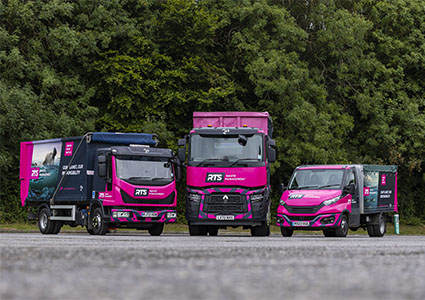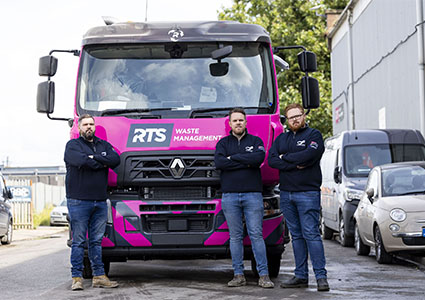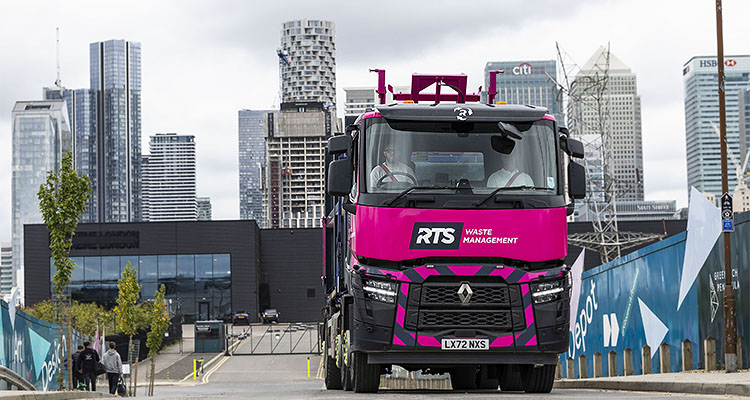How RTS Waste Management transforms waste into high quality products for manufacturing
RTS Waste Management (RTS) is a second-generation family owned and operated recycling and waste management provider. Transport & Sales Director, James Redmond gives a brief overview of the journey: “We started back in 1986, founded by our Managing Director Mark Redmond. Mark built our first lorry and began running waste from site to tips. Some of his earliest work was on the construction of Canary Wharf and Hammersmith tube station. The business and services we provided grew from customer demand, and we would regularly get asked if we provided skips. ‘We do now’ Mark decided. He bought a skip lorry and a few skips and that’s how our skip service was born.
“The same can be said for our dustcarts and our wheelie bin services; the range has grown over time and as a result, so have the types of industry that we provide these services to. In the beginning we worked almost exclusively with construction and demolition companies. Now we operate in areas including retail, commercial, residential, manufacturing and distribution, which has given us a wider field of focus. Essentially if you have waste, we can offer a service tailored to your specific demands and needs.”
these services to. In the beginning we worked almost exclusively with construction and demolition companies. Now we operate in areas including retail, commercial, residential, manufacturing and distribution, which has given us a wider field of focus. Essentially if you have waste, we can offer a service tailored to your specific demands and needs.”
Extensive offering
James goes on to explain in more detail the specific services the company provides: “As a total waste management provider, we offer a range of zero-to-landfill services including skips, roll on roll offs, cage and tail lift vehicles, a wheelie bin service, grab hire, Hiab, and bulk haulage. These services are for all waste streams, even the more difficult waste which can fall under Control of Substances Hazardous to Health legislation (COSHH). Where possible, we utilise technology to reduce service requirements, movements, energy consumption and space restrictions.
“We offer these services around the clock, every day of the week, whatever the requirement may be. Clearance and special events waste management are also a key part of our service offering, supplying equipment and containers well in advance or at a moment’s notice in the most sustainable ways possible.”
Circular solutions
James moves on to highlight the company’s state-of-the-art waste transfer facilities which make these services possible: “Our two sites have an extensive list of waste streams we can accept, which gives us versatility in the locations and business demographics in which we’re able to work. Some of these include airport and aviation waste, offensive waste and asbestos. Using the systems and technology that we have in place, we are able to de-engineer the wastes that we receive and segregate these so that they may be returned to the manufacturer they were originally produced by. This means that we can guarantee a closed loop recycling service. There’s no need for new raw material to be used; the same material can be kept in circulation and given life again as a new product. Our efforts contribute to the real reduction of carbon emissions and energy use as well as reinforce the circular economy model which reduces the need for raw materials.”
 The company is constantly innovating, incorporating new technologies and equipment that increase the efficiency and capabilities of its facilities. James elaborates: “The innovations we are working on will allow us to further reduce the volume of non-recyclable waste we take for thermal treatment. These changes allow our facilities to increase recycling figures, reduce carbon emissions and drive us closer to our goal of becoming a commodities manufacturer. We see that there is a solution for every kind of waste and, in time, we will be taking every waste stream that we accept, de-engineering it and producing a product from the very same material. We are introducing the use of AI which will aid in our journey, not for the replacement of humans but to enable upskilling, which will enable our people to transition into better, more skilled roles.
The company is constantly innovating, incorporating new technologies and equipment that increase the efficiency and capabilities of its facilities. James elaborates: “The innovations we are working on will allow us to further reduce the volume of non-recyclable waste we take for thermal treatment. These changes allow our facilities to increase recycling figures, reduce carbon emissions and drive us closer to our goal of becoming a commodities manufacturer. We see that there is a solution for every kind of waste and, in time, we will be taking every waste stream that we accept, de-engineering it and producing a product from the very same material. We are introducing the use of AI which will aid in our journey, not for the replacement of humans but to enable upskilling, which will enable our people to transition into better, more skilled roles.
“This year, we will be adding a new capability, to recover two new waste streams from our facilities. These are typically difficult-to-recycle items that historically within the industry, would find their way into landfill sites as they are not generally accepted as recyclable. We have been integral to the research partnerships that allow us to create circular solutions with manufacturers and end destinations alike. We look forward to announcing them, as it will be exciting to be able to talk more openly about that project.”
Team success
Alongside key strategic investments that increase efficiency and capability, James believes the company’s customer-centred approach has also been a significant driver of the growth the company has experienced this year. “Our revenue has grown substantially. I believe this is largely down to maintaining great relationships with our clients. We listen to their needs and requirements and remain flexible enough that we can adapt our business as we need.
“We have also achieved PAS402 accreditation for sustainability within operations and improved our transport accreditation standings to FORS Gold, an accolade reflecting sustainability and continuous improvement within transport and fleet vehicles. On top of this we have a great team who share a vision and aligned goals. Every one of our team members plays an important role in ensuring our success.”
Looking to the future, the business is well positioned to capitalise on new opportunities. James outlines what the company’s hopes are for the coming year: “In 2025 we will bring more of the same energy and drive with a constant focus on innovation. Moving forward, with more efficient processes in place, we will go from strength to strength. The waste industry is very dynamic, it is constantly evolving and growing, so this year should be an exciting one. We are looking forward to what it has to bring!”
